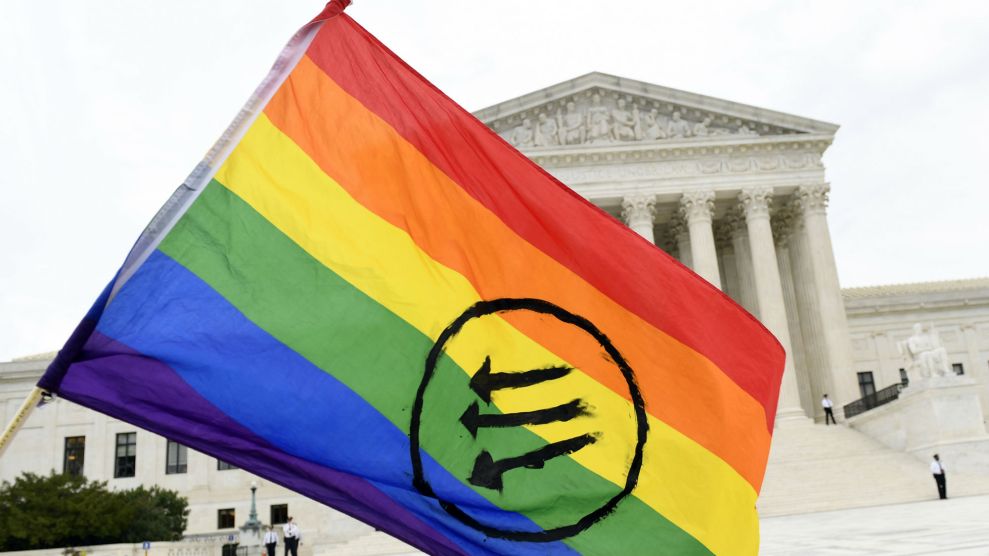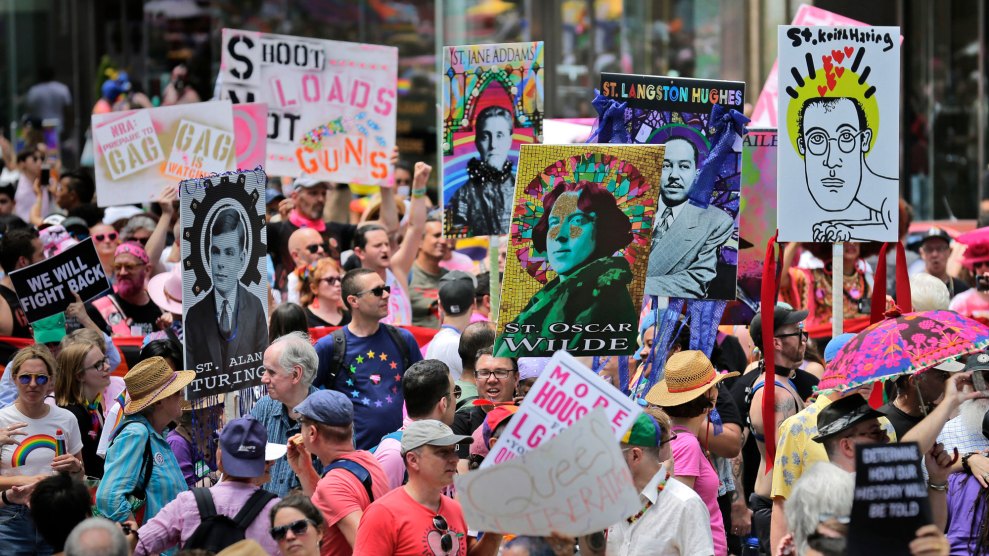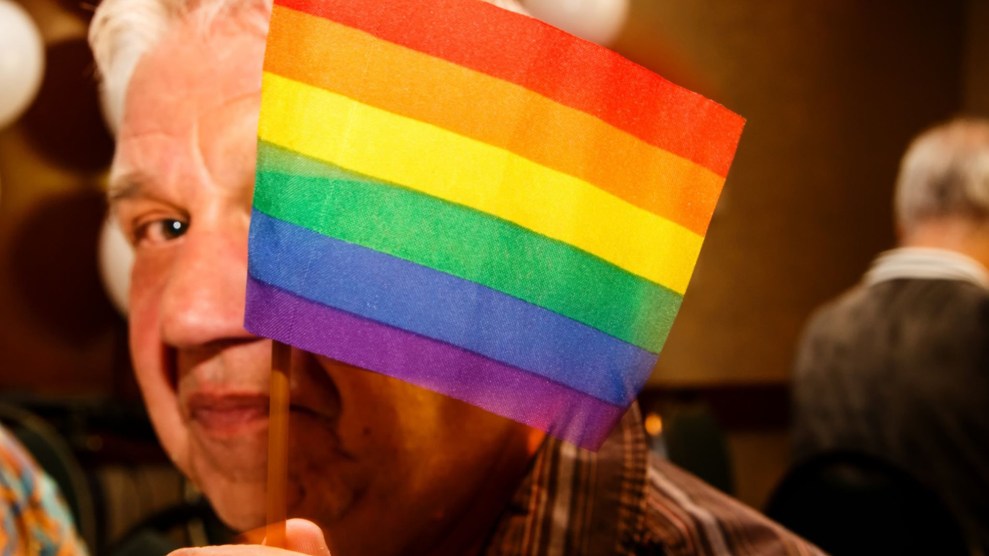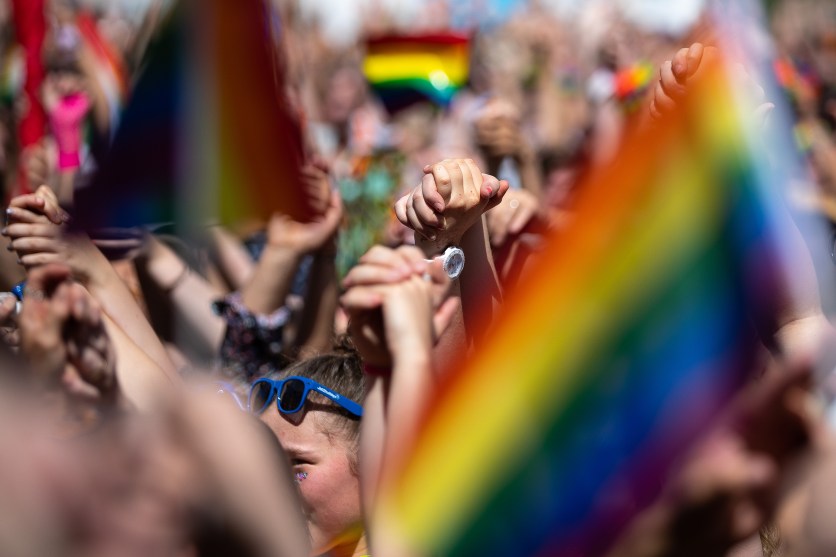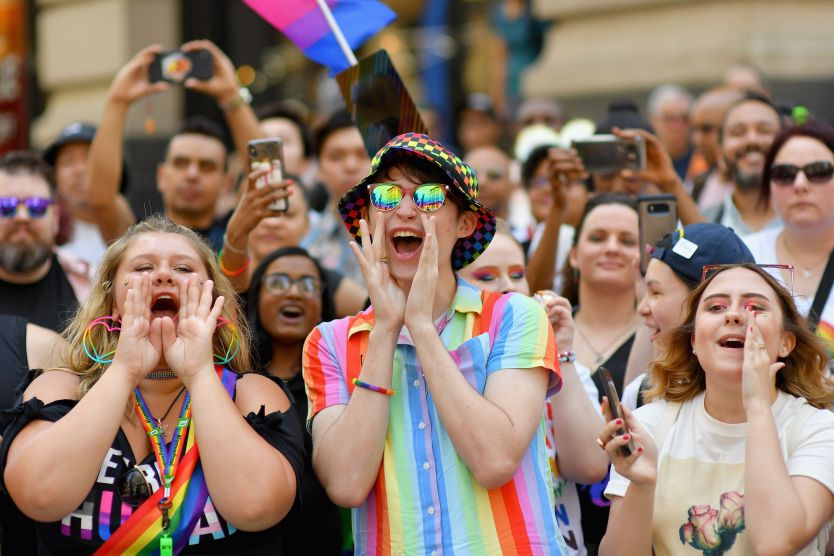
Angela Weiss/Getty
To celebrate National Coming Out Day, I asked the queers of the Twitterverse what music was instrumental in their coming out to the world:
hey queers!! I’m really curious as to what music was instrumental in your coming out process. If you’re interested in talking to me about it for a music bit I’m writing, would love to include you 😌🥰 my DM’s are open!
— sam (@samvantheman) October 10, 2019
They responded not just with the songs they felt were most associated with coming out but also with their thoughts about how music connects specifically with the queer experience. Some even offered advice for those who are still finding their way out of the closet. These answers have been edited and condensed for clarity.
“Shake It Out,” by Florence + The Machine
“I listened to it on repeat the night I came out. There’s a lyric, ‘It’s always darkest before the dawn’ that I kept scribbling into my journal until I finally got the courage to go upstairs and tell my parents I was gay. I knew things would be awkward and wasn’t sure how they’d react, but that lyric gave me a lot of comfort because no matter what happened I was determined to make the best out of the situation. Coming out never stops, but it honestly gets so much easier over time the more you do it—to the point where you don’t even think about it as coming out anymore and just sharing who you are.”—Phillipe Thao, 23, Chicago
“Loser Like Me,” by the Glee cast
“It’s a song about empowerment in the broadest sense. It subverts their ‘loser-ness’ by turning it into something to be proud of. It kind of mirrors how queer people have long turned sources of derision into sustenance. I often think that pop music is especially queer, because it grapples vaguely with themes like love, dreams and dreaminess, and longing, and queer people can latch onto those themes in a way specific to them. It seems like people—straights, I mean—often think, ‘You should just do it—I know that your family will understand!’ But it’s not that simple. For me, building up a small army of people you know will back you helped prepare me for potentially harder coming out conversations.”—Brandon Tensley, 29, Washington, DC
“So Unsexy,” by Alanis Morissette
“I have an insanely vivid memory of being in sixth grade, desperately in love with my best friend and terrified about what that meant, keeping all these big scary feelings inside—believing I was totally alone and misunderstood. This song was the one thing that made me feel like I wasn’t this weird, horrible abomination, and that maybe what I was feeling wasn’t actually wrong or bad. The first time I heard a female artist sing about heartbreak using she/her pronouns to talk about her love was life changing. Knowing there are other people out there, going through the exact same thing, having those same experiences, makes your entire identity feel more valid. The real scary thing is not being able to live your truth, so if you’re in a place where you can safely [come out], you absolutely should.”—Lauren Feller, 28, Los Angeles
“BFF,” by Kreayshawn
“I was really obsessed with Kreayshawn when I was reconciling my sexuality. I never had a coming out moment where I made a public announcement, I just started acting more like myself continuously and being more honest about everything. ‘BFF’ gave me the courage to come out to my best friend at the time, because it reminded me that she was my best friend and was going to support me. Your coming-out process is ultimately about you and improving your life, so while other people’s experiences may help you to understand how you want to approach it, just keep in mind that it’s not about what others expect from you or what you think others want. Do what feels right when it feels right for you.”—Matt Van Ommeren, 24, Queens, New York
“Freedom,” by Beyoncé
“I cannot fully articulate the feeling in my body when I watched the visual album and how much it connected with my soul. It empowered me as a Black woman. It empowered me as an African woman. It empowered me as a queer Black African woman. Hearing the power in her voice as she sang, ‘I break chains all by myself…’ made me cry and reminded me about the strength of Black women, but also the need for vulnerability and healing. I was in healthy friendships at that time and luckily for me everyone was very supportive or was like, Bitch, we been knew you’re queer, which made me feel so loved. I love being bisexual. People have varying levels of safety so my advice wouldn’t be ‘come out to everyone!’ The most important thing is to come out to yourself. I am still not out to my mom, which is what it is, but I am surrounded by so many people who accept me. Surround yourself with love and people you feel comfortable enough to come out to. It’ll be hard. It’ll feel weird. But it is such a relief to be who you are and not have to hide it from the whole world.”—Marna Wal, 23, Minneapolis
“Bad Romance,” by Lady Gaga
“Music is just inherently part of the LGBT+ experience. Whatever you’re feeling now has been felt by thousands of others, you really aren’t alone. I felt fully free was when I was home on leave for Christmas after enduring Air Force Boot Camp. Don’t Ask Don’t Tell was still a ‘thing,’ so I still couldn’t be completely open. While it doesn’t always get better, the good times truly outweigh the bad. You find new family and friends, and now more than ever there’s so many avenues to let your flag fly. Come out at your own pace, we’ll be waiting.”—Brad Gilligan, 30, Las Vegas
“The Window,” by Kitty feat. American Pleasure Club
“I’ve been listening to Kitty since she was collaborating with Riff Raff and her music was more hip-hop based. That also happened to be around the time I was a senior in high school, discovering for the first time that I was in love with a girl. Representation matters, and I can’t imagine not having some queer idols growing up to help me feel comfortable with who I am.”—Alexa Jobe, 23, Santa Cruz, California
“A Moor,” by Raleigh Ritchie
“It was the song I was literally spinning the day I came out. [Music] makes you feel less alone. I lived in a small sheltered town with no one else like me, so to hear your experiences out loud through music can be so affirming and make you not feel crazy. Your life and the way the world opens up to you is about to change, but in spite of that, you are free to be your most authentic self. Something most people never get the chance to realize. Embrace yourself and what is to be.”—Uzo, 21, Chicago
“Follow Your Arrow,” by Kacey Musgraves
“When I was coming out it was kind of a weird process because I was sort of outed in high school, which pushed me to come out to my parents and close friends. Music can show queer people that they aren’t alone, and it sounds cheesy but it shows that things do get better. It’s especially true when you grow up where the LGBTQ community isn’t accepted, or if you don’t know many LGBTQ people who can help you through everything. You also don’t have to figure out your sexuality right away, coming out and discovering yourself is a process that takes a lot of time, so go at your own pace and not the pace you think will make everyone else happier.”—Matt Allen, 23, Los Angeles
“We Exist,” by Arcade Fire
“I recall the song and think about the active process of constantly coming out in a physical environment every time I’m out with my boyfriend. [Music] offers a sense of atmosphere—at times it amplified the lowest of lows by stewing or digesting the conflict or insecurity of not adhering to the ‘default’ sexuality. Take your time. There’s no rush. There’s no timeline. Find the people who prove they are worth keeping in your corner, regardless of your path, and look forward to growing.”—Luis Vargas, 24, Chicago
“Teenage Dream,” by the Glee cast
“Ryan Murphy made my song of sadness an anthem of gay pride when Darren Criss sang ‘Teenage Dream’ on Glee to Chris Colfer. That was the first time I’d ever seen anyone like me (a private school gay) on screen. Being gay is dichotomous. I like that ‘Teenage Dream’ exists as a tangible reminder that life being my truest self will bring euphoria and despair. Growing up, I clung to the songs that were playing in moments where I was happy. Coming out is deeply personal and different for everyone. It’s not a monolith. Do it on your terms. And if you don’t have a physical community, go online or find it in art.”—Joseph Longo, 22, New York City, New York
“Normal Song,” by Perfume Genius
“At the time I was feeling a lot of really unbearable self hatred and shame and this song made me feel like my heart was still good and that I was still worthy of love, even if I would never be ‘normal.’ Music can tell us things that we’ve never heard, or might never hear explicitly, from the people in our lives. I needed to hear that I wasn’t broken, and I definitely didn’t know how to ask for it, but I could listen to these songs and hear it over and over again. You will find people who understand you, see you, and care deeply about you. No queer person fits into a single mold and it’s okay for your identity to grow and change and be fluid. However and whenever you choose to come out is the right time and way.”—Sam Bellamy, 25, Brooklyn, New York

